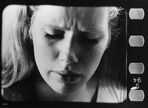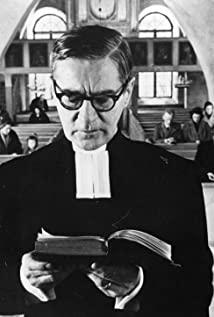Recently, I have been in a state of active aphasia. I say I am active because I have not lost my voice, and refusing to speak is not completely silent, but for me, it shows my determination to refuse to show my heart and refuse to connect with the world. This state reminds me of Bergman's film, The Mask.
Elizabeth, an actress who refused to speak after a performance, was admitted to a mental hospital after doctors said she was "healthy". Why Elizabeth decided to remain silent, the film tries to illustrate with her actions in the ward and the narratives of others: in watching the TV report of the self-immolation in the Vietnamese monks square, she felt a certain shock, and the rising fire of the monks sitting silently was The anger of silent resistance; the doctor's words reveal her secret thoughts, as an actor, she is always playing a role, and language as a tool is the accomplice of all this, she wants to be real, remove the disguise of language; The dialogue shows that she is also an actress in life, playing the role of a wife and a mother who loves her children, and the language reinforces these images.
Alma is a nurse who accompanies Elizabeth to take care of her in a nursing home on a desert island. In the process of getting along, Alma tries to talk to Elizabeth, but Elizabeth doesn't say a word. Alma gradually became the narrator, and Elizabeth seemed to listen patiently to her experience. Elizabeth's silence encouraged Alma to get deeper and deeper into her heart, and one night, she desperately confessed to her painful past with a child of two men and one woman. Elizabeth comforted her silently as usual, but revealed her analysis of Alma's experience in a letter to the doctor. Alma was furious when she saw the content of the letter. The trust she thought was built between them collapsed. She questioned her and yelled at her. She continued to respond with silence. In a fit of anger, Alma picked up a saucepan with boiling water and gestured to throw it at Elizabeth. In a hurry, Elizabeth blurted out: "Stop!" Alma relaxed. He came down and asked, "Are you afraid just now?"
If it weren't for the visual dissatisfaction shown by Alma, the silent person would inevitably endure this kind of internal torture, because at the root, silence is an explicit form of arrogance and inner cruelty, which is a kind of harm to those close to him. When faced with Alma's trust, she needed to respond to her with the same candor, she did not speak, she unleashed kindness, but more as a bystander, treating her as a research object; and in jeopardizing her life When she was safe, she instinctively used language to protect herself, indicating that silence was only her choice, and language itself did not fail.
If Alma represented Elizabeth's true self, and Elizabeth as an actress was just a mask of self, then she chose to maintain the mask at that moment, but since then, her decision has changed, and she has changed from looking at it as a bystander. The inner role becomes the role of dealing with the world with the true self. So, after Elizabeth pushed Alma out and asked her to hug and have sex with her husband instead of herself, Alma became Elizabeth, and "hidden" herself, that is, the mask receded, and Elizabeth chose the truth.
Why do I associate my reluctance to speak and my refusal to talk to the world? Because my attempts to express myself with the outside world have failed, my choice is out of revenge, I just want to convey my anger and helplessness, I feel that I have no better way to fight back than silence, but silent resistance is destined to be lose.
View more about Persona reviews










